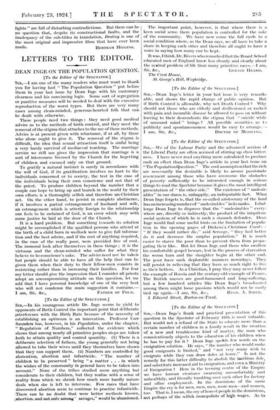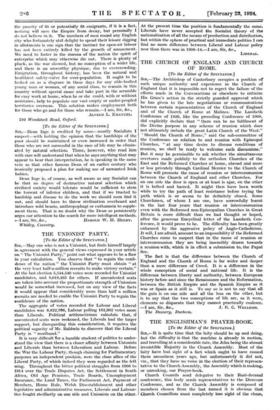[To the Editor of the SPECTATOR.] SIR,—Dean Inge's frank and
practical presentation of this question in the Spectator of February 16th is most valuable. But would not a refusal of the State to educate more than a certain number of children in a family result in the creation of a new and troublesome kind of martyr, the man who conscientiously objects to the education of his children when he has to pay for it ? Dean Inge spends few words on the emigration solution. He says, " the number who would make good emigrants is limited," and " not very many wish to emigrate while they can draw doles at home." Is not the remedy for this latter difficulty to abolish the insidious dole, and substitute increased aid to emigration, and even a Ministry of Emigration ? Here in the teeming centre of the Empire we have human creatures swarming uncomfortably and unhealthily, and literally tumbling over each other for factory and office employment. In the dominions of the same Empire the cry is for men, men, men, more men—and women, too. That is, I mean, the cry of honest people in the dominions, not perhaps of the selfish monopolists of high wages. As to the paucity of fit or potentially fit emigrants, if it is a fact, nothing will save the Empire from decay, but personally I do not believe in it. The numbers of men round any English city who fortunately still delight to spend their leisure digging in allotments is one sign that the instinct for open-air labour has not been entirely killed by the growth of amusement. We need to foster in the masses of the nation the spirit of enterprise which may otherwise die out. There is plenty of pluck, as the war showed, but no conception of a wider life, and there is an unworthy physique, due to overcrowding. Emigration, throughout history, has been the natural and healthiest safety-valve for over-population. It ought to be looked on as a disgrace in these days for any able-bodied young man or woman, of any social class, to remain in this country without special cause and take part in the scramble for easy work at home, when he or she could, with or without assistance, help to populate our vast empty or under-peopled territories overseas. This solution makes employment both for those who go and for those who remain.—I am, Sir, &c., ALFRED L. EMANUEL.
210 Woodstock Road, Oxford.











































 Previous page
Previous page